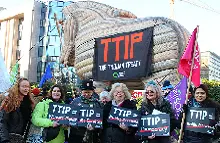Het was een klein berichtje, maar daarom niet minder belangrijk: het Waals Gewest, een van de vele parlementen dat België rijk is, wil het associatieverdrag tussen EU en Canada (Ceta) niet ratificeren. Canada? Is mij even iets ontgaan? Is dat land inmiddels even corrupt als Oekraïne en mag er daarom geen zaken mee worden gedaan? Of maakt het feit dat we tijdens de Tweede Wereldoorlog mede door de Canadezen zijn bevrijd hen ineens verdacht? Nee, het heeft te maken met de groeiende aversie tegen multilaterale verdragen.
Toen president Obama afgelopen week in Europa was, gingen in Hannover 25.000 mensen de straat op om te protesteren. Niet alleen tegen Ceta, maar vooral tegen TTIP, het handelsverdrag tussen de EU en de Verenigde Staten. Waar de demonstranten precies tegen waren was niet helemaal duidelijk. Het omstreden arbitragesysteem waarmee bedrijven overheidsbeleid kunnen dicteren was toch van de baan? Een veelgehoorde klacht was het gebrek aan transparantie van de onderhandelingen en aan het ondergeschikt maken van alles aan de economie. Dat laatste moet iets te maken hebben met het neoliberalisme, dat inmiddels past in het rijtje erkende zondebokken van bankiers, multinationals en grootkapitaal. Kennelijk vormen die een samenzwering die de welvaart van de hardwerkende burger schaadt.
Nationalisme en protectionisme
Het IMF uitte in de recente World Economic Outlook zijn zorg dat handelsverdragen niet meer op brede steun in de westerse wereld kunnen rekenen. Het IMF constateert dat een ‘ieder voor zich-periode’ op aanbreken staat, waarin nationalisme en protectionisme zegevieren en de fundamenten van onze welvaart, en onze stabiliteit, aantasten. Zo klonk begin april al een Nederlands ‘nee’ tegen het associatieverdrag tussen de EU en Oekraïne. Inmiddels is duidelijk dat dit neekamp ook tegen TTIP is.
Lees de hele column in Trouw





